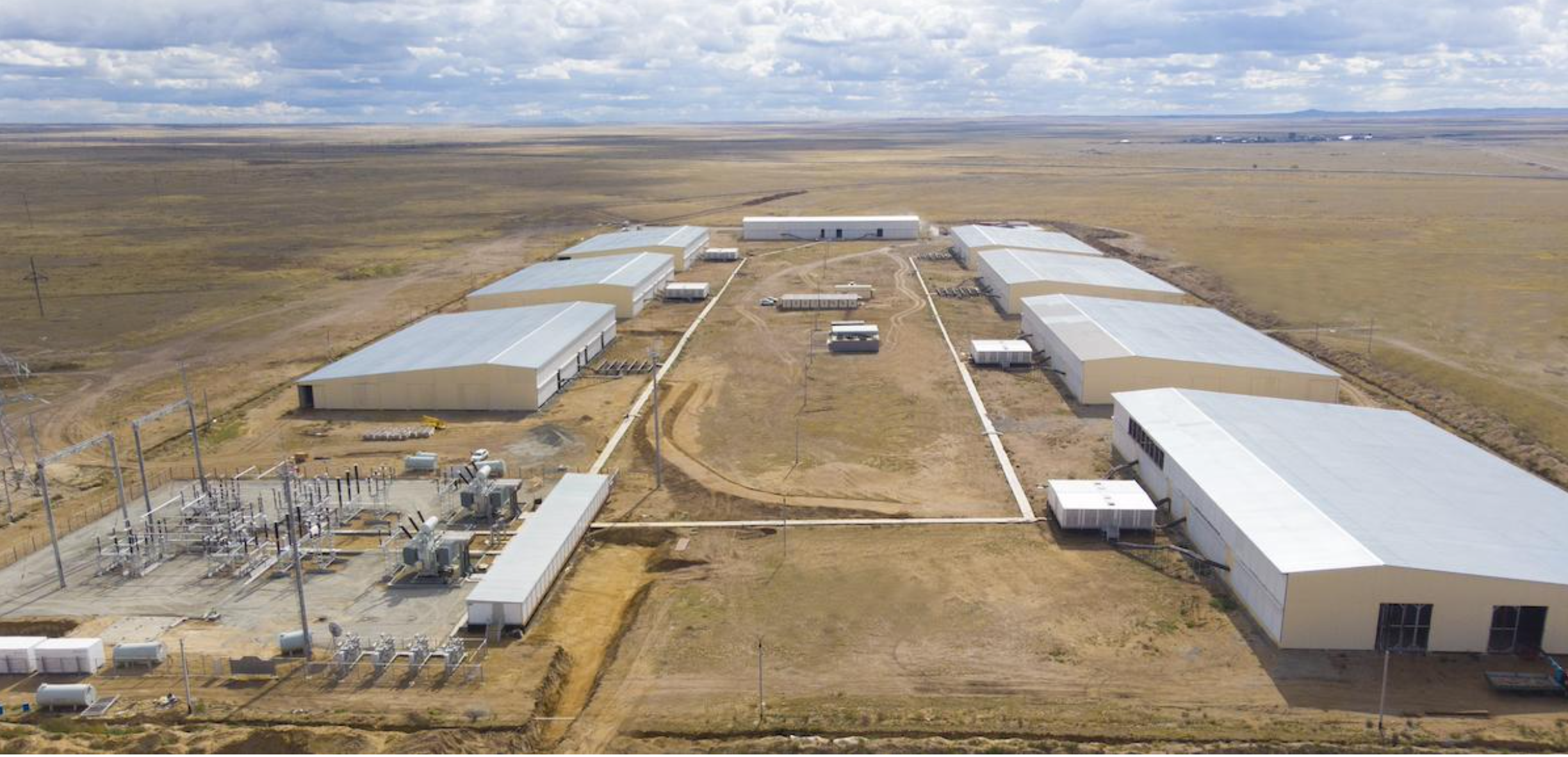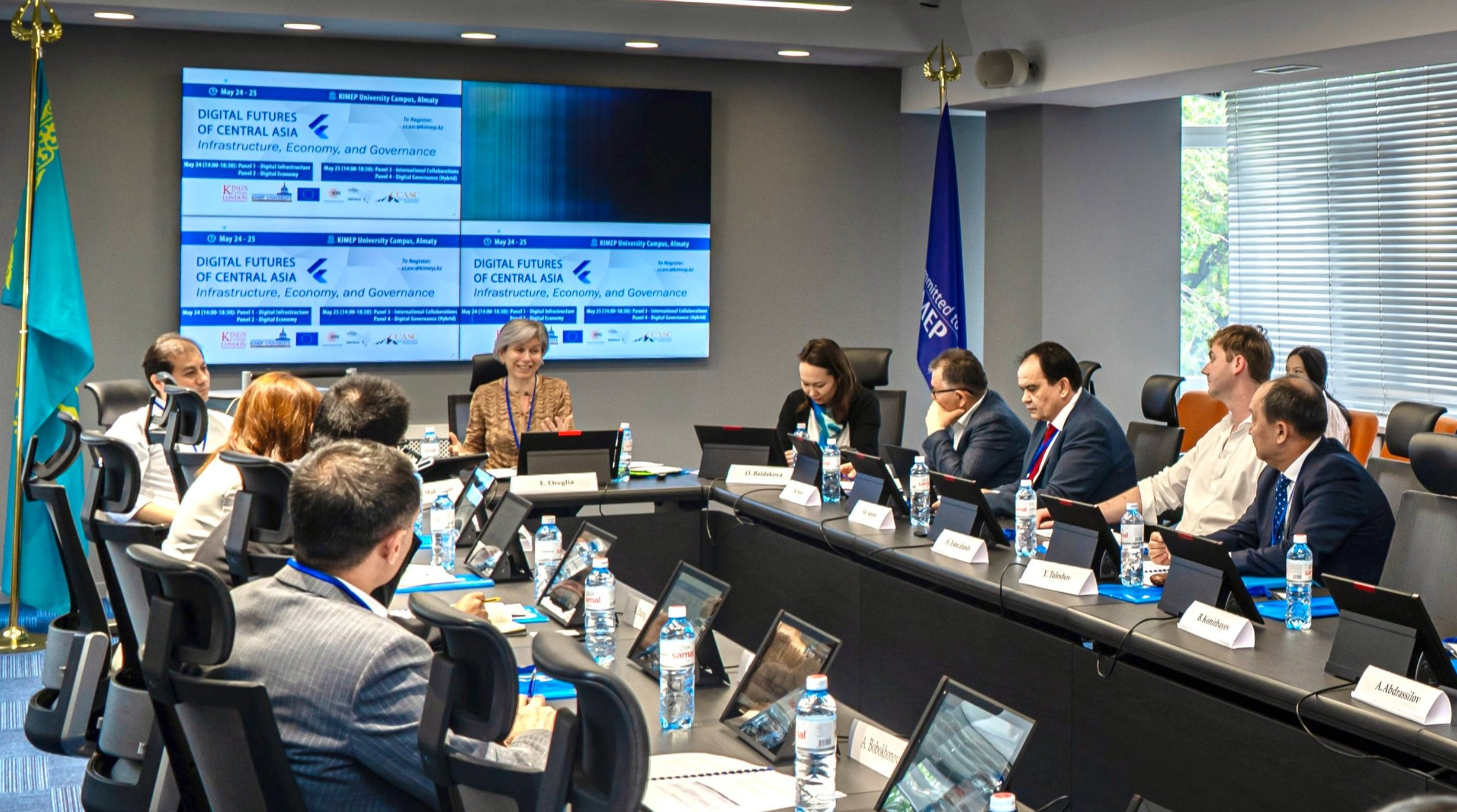DFCA23: Exploring the Digital Future of Central Asia
The digital landscape of Central Asia is rapidly evolving, driving unprecedented changes in the way the region lives and works. Connectivity has become more essential than ever, but how is it evolving, what is working, what are the biggest challenges? DIGISILK, with the support of the ERC, and CCASC invited a group of academics, policy-makers, and NGO workers from Central Asia to discuss these topics for 2 days of closed and open-door sessions in Almaty, Kazakhstan, and online.
From Hugo Estecahandy’s presentation, [image credit: enegix]
The first day, May 24, showcased an engaging line-up of presentations that provided deep insights into Kazakhstan's digital landscape. Professor Shakhmaran Seilov of Eurasian National University opened the Digital Infrastructure panel with his talk on the transit telecommunications potential of Kazakhstan, shedding light on the country's connectivity prospects via the Caspian Sea. Mr. Shavkat Sabirov, Director of the Institute for Security Studies and Development in Central Asia, delved into the crucial connection between national cybersecurity and national sovereignty. Mr. Hugo Estecahandy, a PhD Candidate at University Paris 8, uncovered the implications of cryptocurrency mining with his presentation on the "Geopolitics of Bitcoin Mining in Kazakhstan." Lastly, Oyuna Baldakova, Research Associate at King's College London, shared insights into the multiple dependencies that exist within the Kazakh digital ecosystem from her paper on "Digital Roads of Kazakhstan: Technological Dependencies and Local Agency." The panel's central theme of sovereignty versus dependency sparked engaging discussions, providing attendees with a better understanding of the complexities of Kazakhstan's digital infrastructure and connectivity.
From Oyuna Baldakova’s presentation, [image credit: Jim Cowie, RIPE]
Professor Eldar Madumarov of KIMEP University kicked off the Digital Economy panel talking about the rise of the digital economy, highlighting trends, opportunities, and challenges, and offering valuable insights into the dynamic nature of the digital economy. Ms. Maiya Suyunchalyeva, a PhD Candidate at Al Farabi University, explored the impact of mobile payment services on inbound tourism in the post-COVID-19 era, and Mr. VladimirPopov, the Director of KBTU Startup Incubator at Kazakh-British Technical University, showcased his project on integrating start-up incubators within the academic curriculum.
‘DFCA23: Digital Future of Central Asia’ Day 1, held on May 24, 2023, at KIMEP University, Almaty
The panel was closed by Ms. Gulira Abrayeva, a Senior Lecturer at NARXOZ University who shared her insights on the interplay between digital infrastructure and the development of e-commerce. This panel presented both challenges (e.g., losing jobs to AI) and opportunities (e.g., e-visa services and increasing opportunities for bottom-up entrepreneurship) emerging from the new digital landscape in Central Asia.
The second day of the symposium focused on regional aspects of digital connectivity. A closed-door discussion on international experiences of digital connectivity featured Professor Zhang Xiaotong of Fudan University, who provided a comprehensive Chinese perspective on the Digital Silk Road, shedding light on its history and main actors, followed by Dr. Albina Muratbekova, a Senior Research Fellow at Ahmet Yesevi Kazakh Turkish International University, who discussed digital transformations among members of the Eurasian Economic Union. Mr. Abbos Bobokhonov, a PhD Candidate at UWED, talked about the Digital Silk Road in Uzbekistan, and Mr. Medet Suleimen, a Program Officer at Friedrich-Ebert-Stiftung Kazakhstan, rounded up the panel by bringing in the European Union digital diplomacy efforts in Central Asia. These presentations highlighted the different international actors active in the digital realm in this region, and their relationships with individual countries and Central Asia as a whole.
From Medet Suleimen’s presentation, [image credit: EEAS].
The final hybrid panel on Digital Governance brought together experts who shared valuable applied and academic insights on various aspects of digital government and governance. Mr. Bayan Konirbayev, Chief Digital Officer of Almaty City, discussed the city's initiatives and strategies in digital transformation. Mr. Farrukh Khakimov, Head of Department on Foreign Policy and Security at the Development Strategy Center of Uzbekistan, summarized the evolving landscape of digital governance in the region. Mr. Talant Sultanov, Chair and Co-Founder of Internet Society-Kyrgyz Chapter, talked about Ilimbox, a project to close the digital divide in Kyrgyzstan.
From Talant Sultanov’s presentation.
Professor Zhyldyz Tegizbekova of Alatoo International University and KAZGUU, presented a case study on data governance and personal data protection in Kyrgyzstan, where a pioneering legal protection for personal data is not easy to enforce. Lastly, Professor Aigul Adibayeva of KIMEP University shared insights on challenges and opportunities of E-Government in Kazakhstan. The symposium closed with a keynote by Mr. Yahiya Tuleshov, Deputy Chairman for Operations at E-Finance Center JSC, who provided a comprehensive overview of the current and future digitalization challenges in Kazakhstan and Central Asia. His insights highlighted the importance of Central Asia in the Digital Silk Road and the common challenges facing all the countries of the region, such as digital sovereignty, data protection, and digital skills development.
‘DFCA23: Digital Future of Central Asia’ Day 2, held on May 25, 2023, at KIMEP University, Almaty
The symposium provided a chance for people who look at theoretical and applied aspects of the digital in Kazakhstan and Central Asia to come together and discuss their experiences, learn from each other, and imagine future collaborations. Key insights included the importance of robust digital infrastructure to support connectivity and foster a regional integration that safeguards national interests, and that takes into consideration the different levels of informatization in different countries. Many presenters emphasized the importance of the regional dimension of connectivity in Central Asia, while being realistic about all the challenges that need to be overcome for increasing collaboration – from different legal regimes, to different levels of economic development and infrastructure. Effective policies and frameworks to ensure data privacy, security, and citizen-centric digital services will need a continuing collaboration between the public and the private sectors, and as Central Asia continues to navigate its digital journey, the symposium’s insights will hopefully contribute to shape strategies and foster a vibrant and inclusive digital ecosystem.
DIGISILK (Digital Infrastructures Along the New Silk Road) is funded by the European Research Council. The research studies the Digital Silk Road from the ground up in China, Kazakhstan, Myanmar and Cambodia.
CCASC (China & Central Asia Studies Center) was launched in 2017 by KIMEP University’s College of Social Sciences. The center is primarily focused on the growing presence of China in Central Asia with an eye on the unfolding events and political processes across the greater Eurasian space.





